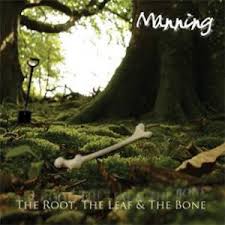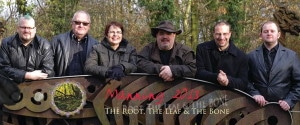Artist: Manning
Album: the Root, the Leaf, and the Bone
Manning, the band led by songwriter/ singer/ many-instrumentalist Guy Manning, play long, evolving, mostly very pretty songs notable for (1) Guy Manning’s Ian Anderson (Jethro Tull)-like voice and melodies and (2) lots of opportunities for different instruments (flute,  clarinet, sax, piano, rock organ, violin) to get little show-off moments. The Root, the Leaf, and the Bone is only the second of their albums I’ve heard, meaning I was startled to discover it’s their 13th record of original songs since 1999. I like it a fair bit better than 2004’s (good) a Matter of Life and Death, but all I can say of the Root, the Leaf, and the Bone‘s place in the Manning discography is that their 2004 and 2013 incarnations are quite obviously the same band, in a way that some 9-year separations of Cure or Rush or Radiohead albums might not be.
clarinet, sax, piano, rock organ, violin) to get little show-off moments. The Root, the Leaf, and the Bone is only the second of their albums I’ve heard, meaning I was startled to discover it’s their 13th record of original songs since 1999. I like it a fair bit better than 2004’s (good) a Matter of Life and Death, but all I can say of the Root, the Leaf, and the Bone‘s place in the Manning discography is that their 2004 and 2013 incarnations are quite obviously the same band, in a way that some 9-year separations of Cure or Rush or Radiohead albums might not be.
I’m dodging the words “progressive rock” because surely that term means “music that makes my wife say ‘Please turn that off'”, and Manning don’t annoy her. Guy’s handsome voice is a scruffy, manly British baritone; the songs are mostly in 4/4; the solos don’t show off *that* much; and the lyrics make sense. The one radio-length song here, Decon(struction) Blues, is as catchy, rocking, and flute-driven as any of Jethro Tull’s Classic Rock hits, and the longer tracks fill out their Tull melodic frames with the pleasant stateliness recalling early, Peter Gabriel-led Genesis. I learned of this new Manning album from ProgArchives, though, and its title track is 12 minutes of heavy segmentation; it’s one thing for me to argue that they deserve a fair chance from skeptics, but there’s no point in denial. It’s a classic-rock friendly, and pastoral-folk friendly, version, that’s all.
I’ll focus on the lovely Autumn Song as my example of how Manning operate. Lyrically it’s about the season when plants, still vibrant, prepare for a season of bleakness and sleep: “The meadow blooms are waning, the hedge rows limply thin/ displaying the empty nests, where the birds were held within/ How easy for time to slip away”. Implicitly, it’s also about death, but “Don’t get depressed too soon/ we all are alive and in tune/ remember this is just an Autumn Song”.
* It begins with two verses of a simple, thoughtful piano ballad, soon accented with saxophone, then joined by shimmering, oscillating high synthesizer, then too by a flute on the chorus as the drum-beat starts pushing it along.
* Two more ballad verses are centered on that flute and sax (oboe? clarinet? the tone feels in-between to me). The second chorus ends on a slightly unnerving note, and a drum-and-several-woodwind instrumental slips towards dark carnival territory.
* A multi-vocal bridge, with sax in smooth-jazz mode, brings the tone from questioning back towards confident.
* Two more verses, louder than before, center on piano and swiftly-picked mandolin. Now the chorus remixes different instrumental tones from before; it re-uses the odd-note ending but moves straight into a confident re-use of the vocal bridge.
* The song’s final minute, of seven, is instrumental, pretty, and reflective, with Guy crooning absently a couple of times: you don’t expect a sudden blooming of new ideas as a song about autumn flows towards winter, but there’s still time to wander around noticing nifty features.
The Forge starts out with a harsh anvil percussiveness, and more forceful organ, but on the whole it’s still gentle, alternately jazzy and full of  rousing group vocals. It celebrates how “the bellows and furnace dance in furious harmony/ wind and flame on a bed of earth in elemental symmetry”, more than it mourns their replacement by assembly line and time-study men; the organ turns winding and sinister when the song comes ’round to the latter’s ascendance, but the sax still tootles along pleasantly. The expansive Old School feels very Supertramp Crime of the Century to me, although its lyrics are a much better-written version of Another Brick in the Wall. The bouncy, fiddle-driven, group-chorusing Huntsman and the Poacher is the 2nd-shortest, 1st-or-2nd-liveliest, and 2nd-most-radio-plausible song here — it eventually fills out with organ, cello, and clarinet arrangements, though, too nicely composed and developed to pass off as a minor deviation. Mists of Morning Calling to the Day is full of percussive oomph and Guy Manning’s loudest, most impressively breath-control-testing vocals.
rousing group vocals. It celebrates how “the bellows and furnace dance in furious harmony/ wind and flame on a bed of earth in elemental symmetry”, more than it mourns their replacement by assembly line and time-study men; the organ turns winding and sinister when the song comes ’round to the latter’s ascendance, but the sax still tootles along pleasantly. The expansive Old School feels very Supertramp Crime of the Century to me, although its lyrics are a much better-written version of Another Brick in the Wall. The bouncy, fiddle-driven, group-chorusing Huntsman and the Poacher is the 2nd-shortest, 1st-or-2nd-liveliest, and 2nd-most-radio-plausible song here — it eventually fills out with organ, cello, and clarinet arrangements, though, too nicely composed and developed to pass off as a minor deviation. Mists of Morning Calling to the Day is full of percussive oomph and Guy Manning’s loudest, most impressively breath-control-testing vocals.
The Root, the Leaf, and the Bone makes the case for Jethro Tull as an important, inspiring band, and for pianos, violins, woodwinds, and both paganism and guild-craftsman pride as natural parts of classic rock. I am sympathetic to these arguments. But it’s the thoughtful loveliness of the music that counts.
– Brian Block
To see the rest of our favorites, visit our Favorite Albums of 2013 page!
